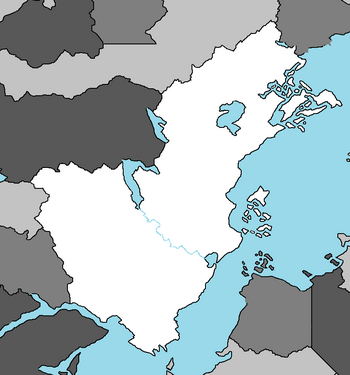Timeria
Kingdom of Timeria Timeria | |
|---|---|
| Motto: "Aim ever higher" | |
| Anthem: Forever Royal anthem: For Our People | |
 Timeria, 2020 | |
| Capital | Infinity |
| Largest | Osea |
| Official languages | English |
| Other type of languages | Other languages list |
| Demonym(s) | Timerian |
| Government | crowned republic |
• Monarch | Kaz Malyna |
| Aneya Raso | |
| Malaya Heard | |
• Speaker of House | Liam Grey |
| Area | |
• | 1,269,345 sq mi (3,287,590 km2) |
| Population | |
• 2020 census | 121 Million |
| GDP (nominal) | 2020 estimate |
• Total | ❖5.22 Trillion |
• Per capita | ❖41,322 |
| Gini (2020) | 40.2 medium |
| HDI (2020) | very high |
| Currency | Bean (BT) |
| Time zone | UTC+N, where N is number of hours |
• Summer (DST) | UTC+N, where N is number of hours |
| Antipodes | countries or islands antipodal to this one |
| Date format | mm/dd/yyyy |
| Driving side | right |
| Calling code | +5 |
The Kingdom of Timeria, also known as Timeria is a sovereign state in the Coalition of Crown Albatross, located on the continent of Adula. It is bordered by Kantoalina, Azil, and Somodi to the west, Artegana and Wareselt to the north, and the Albarine Sea to the east, with maritime borders with Austrolis, Peoratia, New Elkland, and Unified Sera. Timeria spans 1,269,345 mi² and has a total population of 121 million, making it the 11th most-populous nation in the world. It is a constitutional monarchy, with its capital located in Infinity and the largest city being Osea. The Constitution of Timeria establishes the state as secular and democratic, with the current President being Aneya Raso.
The history of Timeria dates back almost 40,000 years with signs of early human civilization, such as some of the earliest bronze tools discovered. One of the oldest known civilizations in world history, for instance, were the Una people who lived deep in rainforests and adapted to the harsh environments, establishing early kingdoms and nation states. The post-classical Timeria was consistent of a rising unitary state on the west coast of the Albarine Sea, with relative isolation from much of the world allowing for sporadic growth, but with key oceanic trade networks spurring development. Timeria emerged as a regional power in the Barretoan Wars of the 1830s, and became more influential in their involvement in international affairs through the 20th century. Experts generally agree that Timeria became most influential in the 21st century with rising economic strides made through its involvement in the Trans Adula Fair Commerce Accord (TAFCA).
Timeria is a highly developed free market economy, with significant sectors in technology, tourism, manufacturing, and energy production. The nation's GDP is estimated to be around 5.219 trillion, with a GDP per capita of 41,322, regarded as the 6th largest economy in the Coalition of Crown Albatross. As a world leader in industrial and technological sectors, as well as a high Human Development Index rating, it is considered a major power and one of the most influential nations in Adula and the world thanks to widespread international investment.
History
Prehistory
Ancient History
Roughly within the area which is modern day Timeria, ten clans were spread throughout the area and were loosely united through a warrior system. Before being united, the clans fought amongst each other for control and would raid nearby neighbors. In some cases, clans would work together to raid merchants on the Bezdekia Road. Much of the fighting was between the Uchiha clan and the Senju clan. Both clans fought for control over what is now the Forever and Ryxyns Coast regions of present-day Timeria.
Post-Classical History
During this time many Timerian began to foster a sense of unity and the Merian Unity formed between the southern tribes of the Meria region. Following this many tribes in Timeria stopped warring with each other and the spread of cultures and commerce began. From 772-797 is considered to be a transitional period prior to the rule of King Jordan.
King Jordan is considered to be the founder of Timeria and one of the greatest political figures in history. Unlike many royals King Jordan was not born into royalty and worked his way up. In Timeria warriors were considered the highest socioeconomic class and Jordan had rose to be the top warrior within all of Timeria. Jordan married the daughter of a powerful Chief of the Senju clan, this created a union between the two clans and ended long term fighting between the two. Soon after the two clans formed a peace other surrounding clans followed suit, including the clans from Meria.
Modern History
Early in the modern era, many foundations of modern Timerian society were formed. Many had expected the union to fall apart after the death of King Jordan, but the nation had continued to progress with relative avoidance of political instability. Most of the Timerian growth was uninterrupted as many developing nations and fledgling empires were focused in East Adula and Euronia. However, in 1830, Timerian naval power participated in coalition activities at the helm of the Barretoan Wars and assisted in battling Skithan imperial fleets in the Emmiria Sea.
In 1951, Timeria committed support to the Allied Forces in the World War in the form of supplies and small detachments of fighter squadrons. Across Timeria production increased and manufacturers worked to meet the demands of the allied forces. Dragonwater became the production capital as the city produced over 1/4th of all exports. Dragon Manufacturing led other manufacturing through its groundbreaking manufacturing methods and efficiency
In 1978, Timeria joined the Coalition of Crown Albatross.
21st Century
On May 6th, 2011, Timeria became a founding member of the Trans Adula Fair Commerce Accord, an economic alliance that incentivized international cooperation in Adula.
In 2021, Timerian forces were deployed internationally in several nations. They operated in Azil in response to threats from the SHADOW syndicate, in Kossmil following terrorist attacks in Dabatta, and in Birat and Estoca at the outbreak of the Birat Civil War.
Geography
Timeria is located in Adula, bordered by the Albarine Sea to the east, Azil, Kantoalina, and Somodi along its western border, Artegana to the north, and Austrolis in the south. In the north, heavy rainforest cover most of the land and the Kirvista Mountains run along the western border. This region is also home to North Kai which sits on the coast alongside the Leo Isles. This region experiences the highest levels of rainfall and the highest temperatures throughout the year.
The Leo Isles consist of 18 major islands, the biggest being Alaraine. While most of these islands are unpopulated Arianna sits on Melirane and is home to 4 million people. These islands are similar to the Northern Region but are less mountainous.
Central Timeria is less mountainous and the rainforest becomes less dense further south. Central Timeria is also home to the Moonstone Highlands. Central Timeria and southern Timeria are separated by the Athacona River. The Athacona river flows out of Lake Noana through central Timeria and into Tianshen Bay
Climate
Timeria’s climate is fairly warm in most regions, but can ultimately be divided into 3 categories. The North has a tropical climate with thick vegetation, forests, and heavy rainfall, while the central area of the country extends into riverplains and deciduous forests, with the southern area of the country consisting of less dense forests and grasslands. Rainfall across Timeria averages around 39 and 50 inches a year.
Biodiversity & Environment
The Kirin Rainforest with large mammals such as Jaguars, and types of monkeys. The rainforest also boasts a huge amount of plant life like Kapok trees, rubber trees, and exotic plants like Heliconia.
There are also a number of coral reefs in Timeria like Nilan's Reef off the coast of Leo Island. Many sea animals live in the waters around Timeria including Angel sharks, Hawkfish, and reef octopus. The greatest predator off the coast of Timeria are Great White Sharks. The Albarine Sea produces one of the world's most biodiverse regions, and Timeria's coasts are particularly diverse thanks to sediment runoff from river deltas.
Landscape
Demographics
Population
Timeria has a population of 121,322,000, making it the 11th most-populous nation in the world, as well as the fourth most-populous nation on the continent of Adula behind Cadair, Vitosium, and Emmiria.
Religion
The Constitution of Timeria guarantees the free exercise and protection from persecution.
Followers of the Book is the most common religion in Timeria with about 30% of the population affiliating with the religion. The religion was started by ,
Islam makes up 9% of the population. Much of Islam's presence in the country can be traced back to explorers and immigrants from the Emmirian Empire, with diasporas of East and Southern Adula's muslim-majority nations having integrated into Timeria's society.
Christianity follows closely behind at 5%, largely stemming from orthodox groups in Central Adula. In particular, Durnstaal and Elkland diasporas contributed to Christianity's sizable population in Timeria. Other Christian denominations of significance include Verdusan Catholicism and the Church of Zian.
Politics
Government
Timeria is a Democratic nation with 3 branches of government and a monarchy. King Infinity is the head of state while President Aneya Raso heads the government.
The federal government is composed of three branches:
Executive: The President is the commander-in-chief of the military, can veto legislative bills before they become law (subject to Congressional override) and appoints the members of the Cabinet (subject to Senate approval) and other officers, who administer and enforce federal laws and policies.
Legislative: The bicameral Congress, made up of the Senate and the House of The People, makes federal law, declares war, approves treaties, has the power of the purse, and has the power of impeachment, by which it can remove sitting members of the government.
Judicial: The Supreme Court and lower federal courts, whose judges are appointed by the President with Senate approval, interpret laws and overturn those they find unconstitutional.
Congress
Administrative Regions
Timeria is divided into 10 administrative regions. Each region has power granted to it from the federal government. Each region has its own government which can operate within Federal constraints. Powers include maintaining a police force and well-maintained militia, collecting taxes, holding elections, and regulating commerce.
Each district has 10 Senators and a number of Representatives based on population that represent them in Federal government.
Timerian Regions
| Largest urban areas of Kingdom of Timeria 2020 National census | |||||||||
|---|---|---|---|---|---|---|---|---|---|
| Rank | Region | Pop. | Principal settlement
| ||||||
| 1 | Ishaana Region | 37,000,000 | Osea | ||||||
| 2 | Rynx Coast Region | 25,000,000 | Infinity | ||||||
| 3 | Forever Region | 19,000,000 | Mai | ||||||
| 4 | Maleia Region | 14,000,000 | Dragonwater | ||||||
| 5 | Astin Region | 7,000,000 | North Kai | ||||||
| 6 | Crystalholt Region | 5,000,964 | Rosecoast | ||||||
| 7 | New Crest Region | 5,000,864 | Sunset City | ||||||
| 8 | Kirin Region | 4,000,375 | Gracemeria | ||||||
| 9 | Leo Isles Region | 3,000,872 | Arianna | ||||||
| 10 | Aquarii Region | 1,000,503 | Lua | ||||||
Foreign Relations
Timeria is a member of many international organizations, such as the Coalition of Crown Albatross, the Trans Adula Fair Commerce Accord, the Coalition Trade Organization, and the C21.
The Department of State is responsible for foreign relations, headed by Secretary of State Aaron Nordquist.
Military
Armed Forces of the Kingdom of Timeria are considered by many military analysts to be some of the most advanced in the world. The Armed Forces receive a little over 19% of the Federal budget. States use their funds to pay for and maintain Regional Guard units. The military is split into 3 branches Army, Navy, and Air Force. Each branch is managed by the Department of Defense and the Armed Forces committee.
The Army is responsible for land-based military operations and is one of the eight uniformed services. The Department of the Army falls under the Department of Defense. The Army is headed by the Secretary of the Army and by chief military officers. The army has a strength of 402,392
The Navy is responsible for sea-based military operations and is one of the eight uniformed services. The Department of the Navy falls under the Department of Defense. The Navy is headed by the Secretary of the Navy and by chief military officers. The Navy has a strength of 298,783
The Air Force is responsible for air-based military operations and is one of eight uniformed services. The Department of the Air Force falls under the Department of Defense. The Air Force is headed by the Secretary of the Air Force and by chief military officers. The Air Force has a strength of 255,607
Economy
Timeria's economy can be described as a capitalist mixed economy led by technology, tourism, manufacturing, and energy production. The Timerian nominal GDP is estimated to be around 5.219 trillion, with a GDP per capita of 41,322. It is typically regarded as the 6th largest economy in the Coalition of Crown Albatross.
Companies
Culture
Timerian culture is fairly diverse and incorporates aspects form many other cultures. While many immigrants have added to Timerian cultures, there are also traditional aspects such as the Familia system that continues to play an important role in Timerian cultures. The Timerian diaspora around the world is particularly seen in developed countries, with large groups of Timerian populations seen in Quetana, Zamastan, Caspiaa, and Vitosium.
Music
The music of Timeria is very diverse and artists display an array of styles. Timerian music is very popular including Hip-Hop and Pop. There are major cultural ties between music is Vitosium and Timeria.
Sports
41% of Timerians over the age of 14 play an organized sport. On the international level, Timeria has excelled at Basketball, Football, Rugby, and soccer. The tropical climate makes beach sports very popular in Timeria. Swimming and surfing are both very popular in Timeria. Rugby has been regarded as the national sport, with National Rugby Union being the top league.
Many cities have multiple professional and amateur sports teams. While Rugby is the nation’s most popular sport this is followed closely by Football and combat sports. The Timerian Football Association is the largest in the nation. There are currently 16 teams across Timeria which compete from May to September and a playoff season in October. There are also a number of combat sports promotions including Generational Warriors Promotion.
The Timerian Olympics Committee also has a large presence in the Timerian sporting world. They actively recruit kids from high schools across the country to train and build the Olympic roster. There are also a number of Olympic training in Timerian, the largest being in Loni, Timeria.
Media
News and Journalism
Timerians do not spend much time reading newspapers, due to the popularity of the internet and broadcast media.
Television
Cinema
Timeria has strong and histroic links with the Cinema industry. Timerian film companies are among the largest and have been a force in the globalization of Timerian culture.
Cuisine
Food is a large part of Timerian culture and sharing a meal with someone is a sign of respect and mutual interest. There are two significant regional differences when it comes to cuisine. The most popular amongst the population are grilling and barbecuing. Populations living in mountainous regions away from the coast mainly the Crystalholt region focus on variations of curries and stews. These are often served with a side of rice. Populations in the mountains often use a variety of freshwater fish, mutton, or preserved saltwater fish.
Alcohol consumption in Timeria is considered normal and many participate in evening drinks. The most consumed drink in Timeria is Tequila, across Timeria there are a number of agave farms with the sole purpose of producing Tequila.









